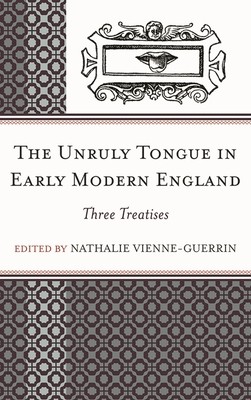
- We will send in 10–14 business days.
- Author: Nathalie Vienne-Guerrin
- Publisher: Fairleigh Dickinson University Press
- ISBN-10: 1611474698
- ISBN-13: 9781611474695
- Format: 15.2 x 23.1 x 2.3 cm, kieti viršeliai
- Language: English
- SAVE -10% with code: EXTRA
The Unruly Tongue in Early Modern England (e-book) (used book) | bookbook.eu
Reviews
Description
The Unruly Tongue in Early Modern England is a scholarly edition of three early modern treatises on the unruly tongue: Jean de Marconville, A Treatise of the Good and Evell Tounge (ca.1592), William Perkins, A Direction for the Government of the Tongue according to Gods worde (1595), and George Webbe, The Araignement of an unruly Tongue (1619). "The tongue can no man tame" says the Bible (James 3:8), and yet these texts try to tame the tongues of men and tell them how they should rule this little but essential organ and avoid swearing, blaspheming, cursing, lying, flattering, railing, slandering, quarrelling, babbling, jesting, or mocking. This volume excavates the biblical and classical sources in which these early modern texts are embedded and gives a panorama of the sins of the tongue that the Elizabethan society both cultivates and strives to contain. Vienne-Guerrin provides the reader with early modern images of what Erasmus described as a "slippery" and "ambivalent" organ that is both sweet and sour, a source of life and death.
EXTRA 10 % discount with code: EXTRA
The promotion ends in 22d.19:29:58
The discount code is valid when purchasing from 10 €. Discounts do not stack.
- Author: Nathalie Vienne-Guerrin
- Publisher: Fairleigh Dickinson University Press
- ISBN-10: 1611474698
- ISBN-13: 9781611474695
- Format: 15.2 x 23.1 x 2.3 cm, kieti viršeliai
- Language: English English
The Unruly Tongue in Early Modern England is a scholarly edition of three early modern treatises on the unruly tongue: Jean de Marconville, A Treatise of the Good and Evell Tounge (ca.1592), William Perkins, A Direction for the Government of the Tongue according to Gods worde (1595), and George Webbe, The Araignement of an unruly Tongue (1619). "The tongue can no man tame" says the Bible (James 3:8), and yet these texts try to tame the tongues of men and tell them how they should rule this little but essential organ and avoid swearing, blaspheming, cursing, lying, flattering, railing, slandering, quarrelling, babbling, jesting, or mocking. This volume excavates the biblical and classical sources in which these early modern texts are embedded and gives a panorama of the sins of the tongue that the Elizabethan society both cultivates and strives to contain. Vienne-Guerrin provides the reader with early modern images of what Erasmus described as a "slippery" and "ambivalent" organ that is both sweet and sour, a source of life and death.


Reviews